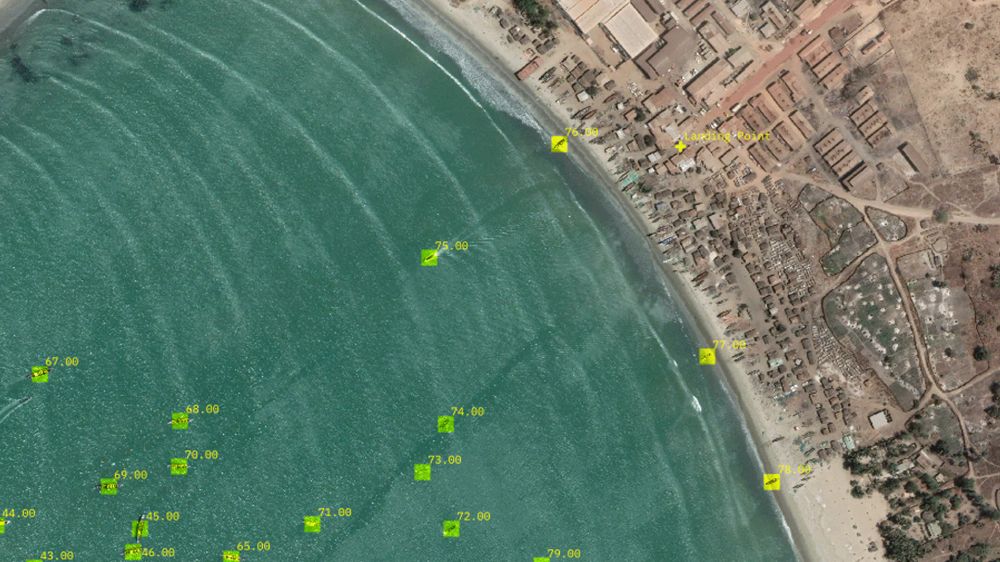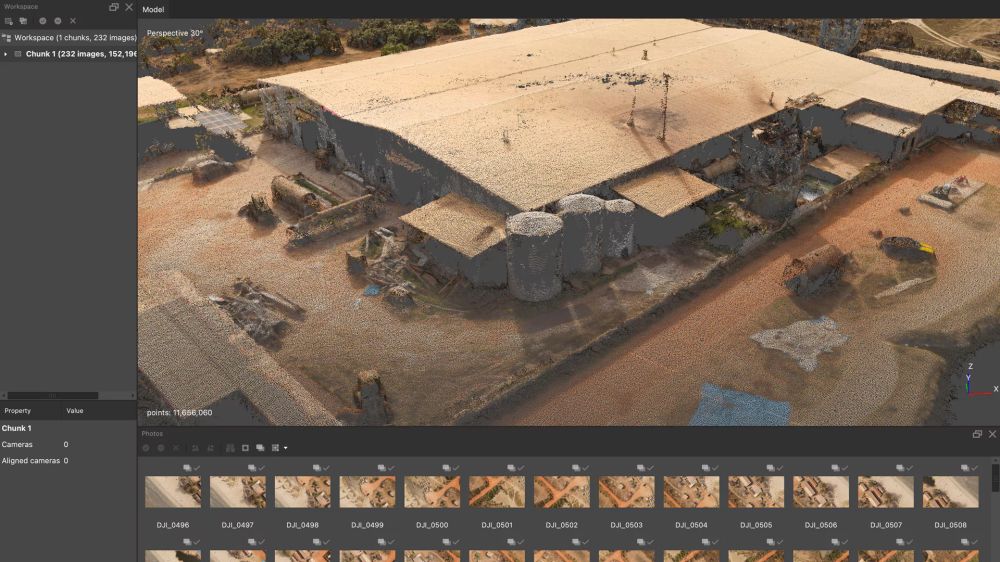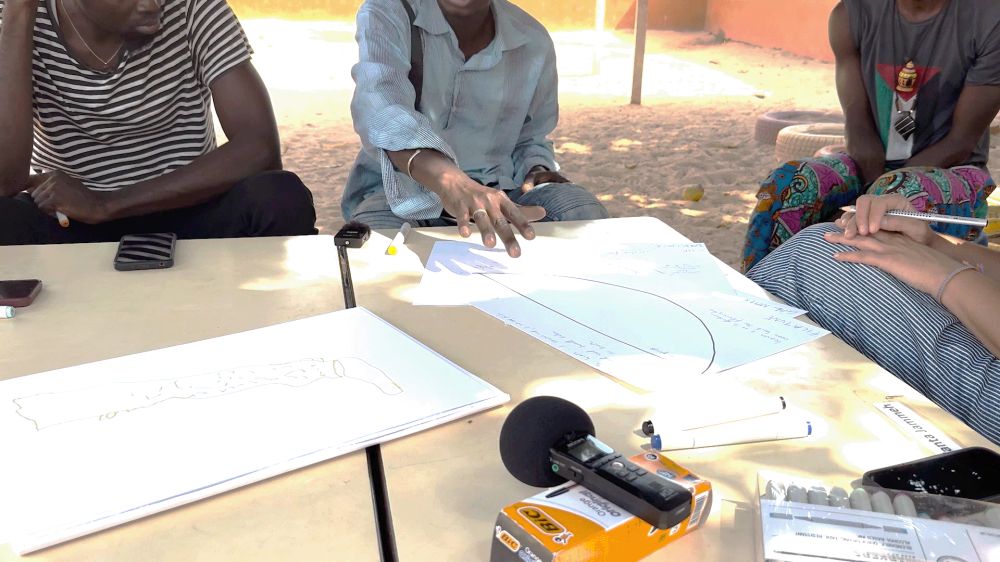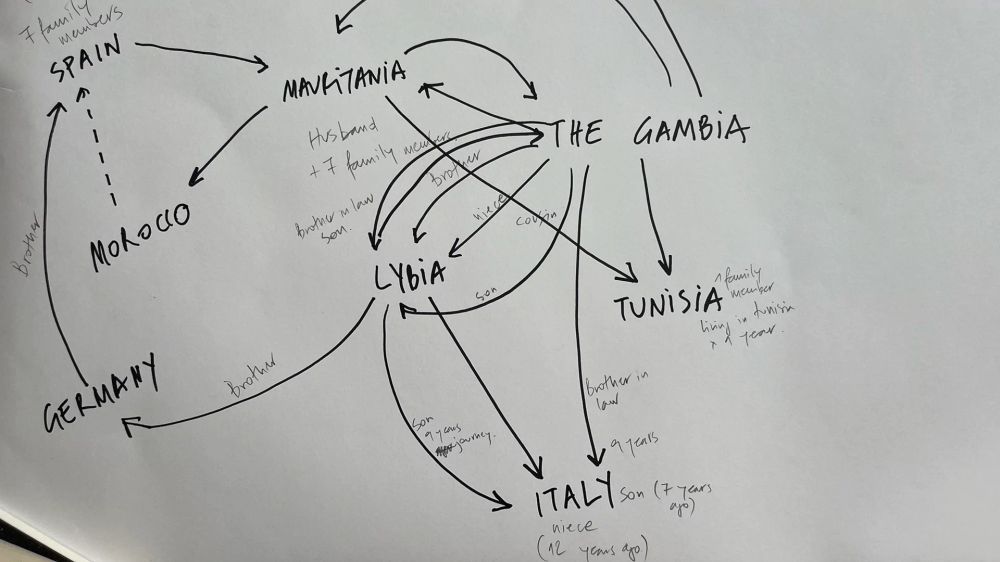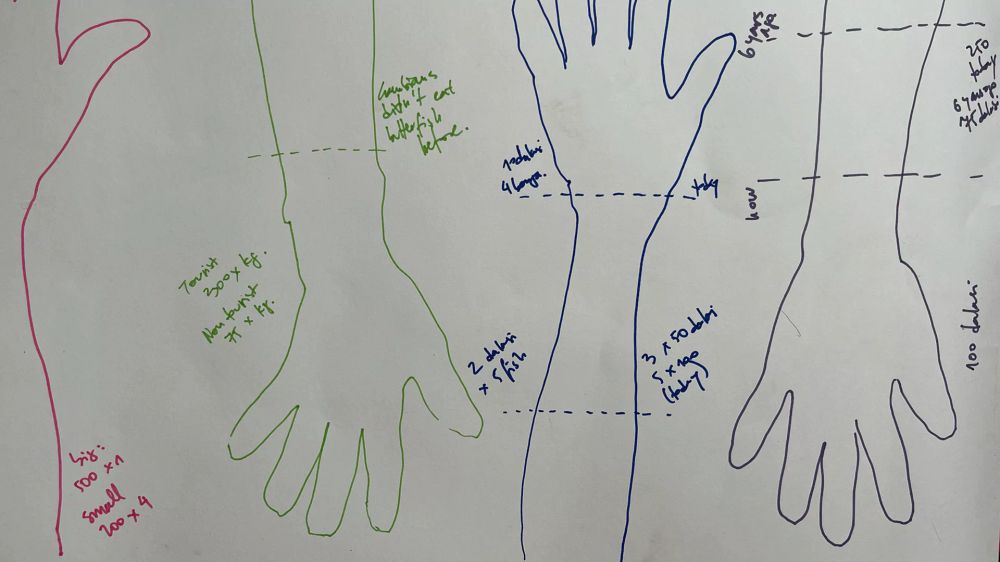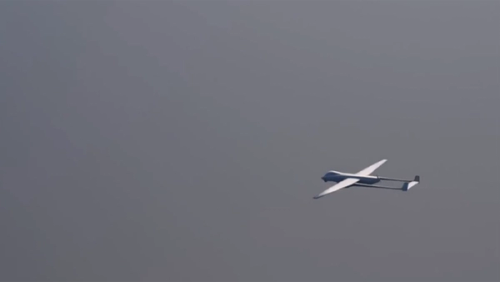Emptying the Sea
Senegambian Coast
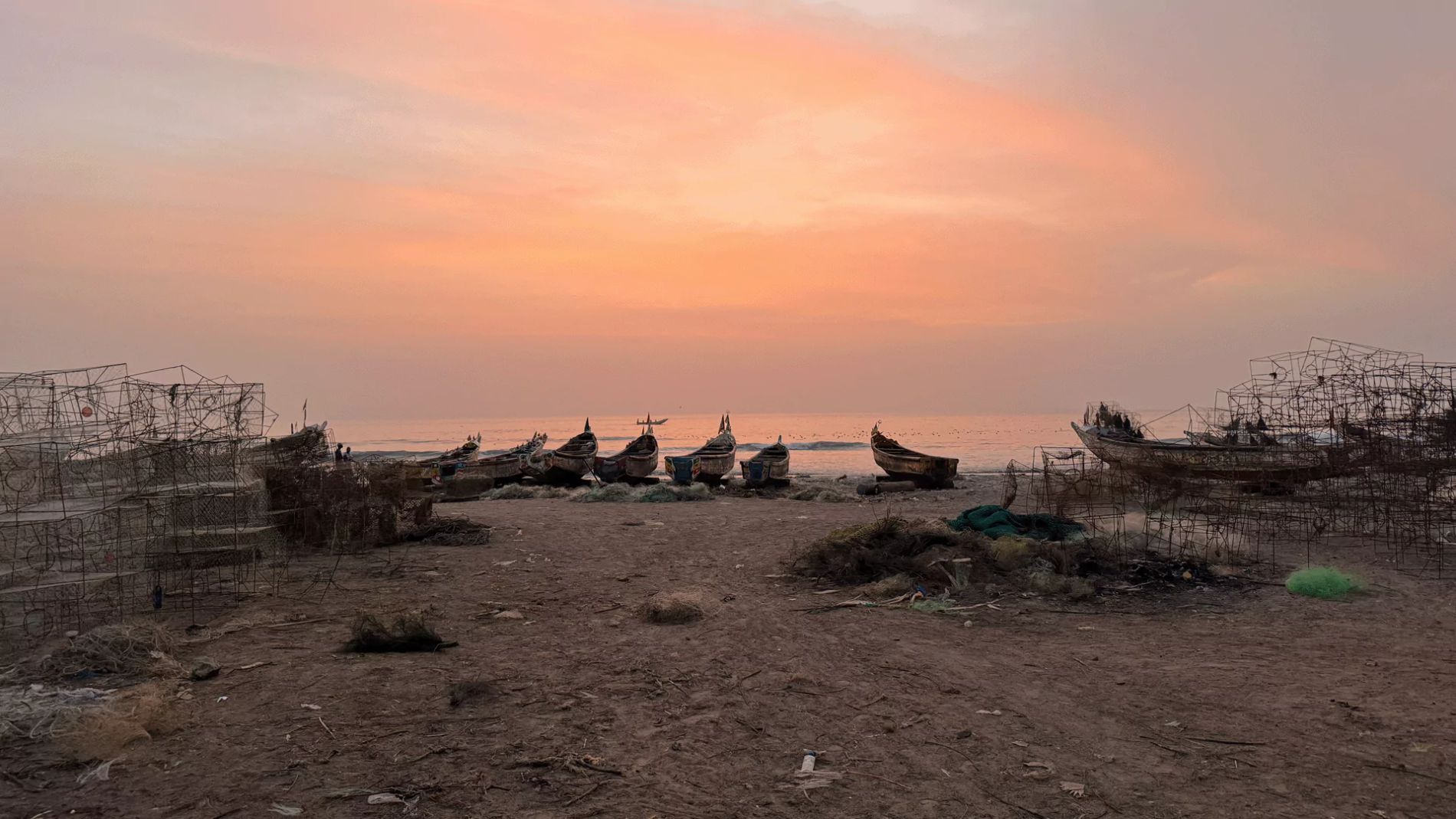
Artisanal fishing vessels moored at Sanyang beach, the site of the Mauritanian / Chinese owned Nessim factory
The waters off the coast of West Africa are rich with fish which has for centuries been a staple food source for artisanal fishers and coastal communities, as well as a central element of their economy and culture. However, this ecosystem is under threat from the growing influence of Chinese-owned fishmeal and fish oil (FMFO) factories which are appropriating vast amounts of pelagic fish stock, particularly in The Gambia. The damaging socio-economic and environmental impacts of this process are threatening the livelihoods of coastal communities, pushing many to seek a livelihood elsewhere. European actors also play a role in the depletion of fish stocks through the purchase of fish and FMFO products for their respective aquaculture and agriculture industries, whilst purporting to adhere to and promoting sustainable fishing practices in policy agendas. Contemporaneously, the externalization of border control is immobilizing affected communities1, as travel not only to the EU but also regionally becomes increasingly restricted2 and dangerous3. This project sets out to re-tie these various elements through witness testimonies, advanced forensic techniques and creative engagements with affected communities and fieldwork both in The Gambia and in Europe, documenting the entanglements of resource extraction and border externalization along the Gambian coastline.
Investigation
Evidencing the social and environmental footprint of fishmeal fish oil production along The Gambian coast.
Emptying the Sea begins at sites of acute disruption and displacement along the Gambian shoreline, investigating the establishment of the foreign funded FMFO factories which are transforming the social and environmental dynamics of local fishing communities. The emergence of the Gambian coast as a global FMFO market has in recent years attracted largely Chinese capital, with the establishment of industrial FMFO factories at Gunjur, Sanyang and Kartong snatching most of the catches of pelagic fish species intended for human consumption and driving the depletion of fish stocks through overfishing. These FMFO factories pose a severe threat to the livelihood of local coastal communities4 and are further entangled in the creation of socio economic5 and racial divisions6 through their exclusive dealings with non-local fisherfolk.
Our investigation focuses on unravelling the socio-economic and environmental impacts of The Gambia’s three main FMFO factories in collaboration with Gambian investigative journalism platform Malagen and Gunjur based environmental scientists CETAG. Our work will focus on utilising 3D forms of analysis and reconstruction to document and amplify narratives of struggles and displacement brought about by the FMFO factories operations. The project will pilot the application of open sources techniques in remote sensing and image supervision to evidence and monitor the FMFO factories entangled relationships with local and migrant artisanal fishing fleets, documenting the environmental footprint of FMFO production along the Gambian coast.
Part 2 of Emptying the Sea evidences how proteins subtracted from coastal communities in Western Africa are feeding Spain’s growing aquaculture and agriculture industries. These intensive farming practices dependant on FMFO products from Western Africa do not only constitute an environmental threat in themselves, they further food insecurities, with food products utilising Western African FMFO often exported back to the region as cheaper, less nutritious, sources of protein. Ultimately, driving forced displacement throughout the West African7 coast as communities struggle to subsist of local proteins and fishing related industries.
Europe's (and in particular Spain’s) role in resource extraction and FMFO production along the West African coast happens against a backdrop of border externalisation, which seek to immobilise the very peoples displaced by extractive policies and practices. Our investigation alongside Italian investigative journalism centre IrpiMedia and PorCausa will trace the wider history of Spain’s border externalisation8 throughout the region and its entanglement with resource extraction, especially fisheries deals and bilateral trade agreements. Through the deployment of open-source investigative techniques part 3 will render visible these entanglements and the architecture of Spain’s (supposedly sustainable) fishing and border policies, highlighting the hypocrisy of the increasing direction of EU funds towards the depletion of resources9 and the confinement of those who attempt to escape the environments rendered hostile by such extraction practices.
Central to our research throughout Emptying the Sea is the need to evidence how growing food insecurity driven by declining fish catches push Gambian coastal inhabitants to attempt increasingly more dangerous and risky journeys from their homeland10. Part 3 of our wider investigation focuses on understanding the parameters which inform not only Europe-bound migration via both the Canary Islands (which have seen a significant increase of arrivals from West Africa over the last few years) and the Central Mediterranean, but also displacement in the region, often rendered invisible by current methods of quantitative analysis by both governmental and non-governmental agencies.
Part 3 seeks to reveal and document patterns of migration criminalisation tied to resource extraction, foregrounding voices of those displaced from the sites of acute disruption, focused on during part 1 of the investigation. Drawing on testimony-based methods, we will reveal complex networks of mobility between both ECOWAS nations and their European neighbors. Unfolding across a time in which under the impulse of European actors certain forms of mobility have been increasingly criminalised in the region: negotiating the establishment of outposts by the Spanish Guardia Civil as well Frontex, the European border and coast guard agency; signing deportation agreements with West African states; and criminalizing those coming from West African coastal communities as dangerous smugglers when caught (allegedly) driving migrant boats to Spain or Italy, thus weaponising the in-depth knowledge of the sea against themselves.
Engagements & Radio Broadcasts
Mappings, drawings and visuals aides produced during workshops led by Clara Dublanc at the Tanji Village Museum and the Sanyang Community Library
Working with Gambia-based partners and stakeholders, the project is facilitating workshops and creative encounters at Tanji Village Museum and Sanyang Community Library, generating spaces where women working as fish retailers, and affected by the rapid deterioration of the fishing industry at the Gambian shores can actively contribute the narration of their experiences. Through moments of active listening, drawings, storytelling exercises and mapping of experiences, the project will create outputs, including a children’s book, paintings, and audio pieces to acknowledge and account for a diverse range of experiences, with peoples, landscapes, stories, ideas and objects being brought into productive collision. The stories are being co-written and edited with all participating women and illustrated by the painters of artisanal fishing boats from the coastal community of The Gambia, also through collective imagination. The publication will be shared with local schools and community libraries across the coastal villages. The sound recordings will become part of an audio piece that will live digitally and be shared in exhibition contexts.
Throughout the duration of 2024 a series of 1 hour radio shows organized by LIMINAL will create a public facing space for the project's development and outreach. Moderated by LIMINAL researcher Alagie Jinkang each show will stage an encounter between 2 invited participants from the communities and organizations dealing with issues surrounding FMFO production, overfishing, migration and border externalization in the Gambia. The initial three initial radio shows will deal with the environmental effects of FMFO production, the social and cultural changes brought about by FMFO factories, and finally experiences of displacement and border externalizations from communities affected by FMFO production and overfishing. Shows will be broadcast live in mixture of both Mandinka, English and Wolof.
Team & funding
Core Team
Extended Team
Collaborators
Funding
Resources
Reports
Amnesty International, "The Human Cost of Overfishing in The Gambia; how the overuse of fisheries resources in sanding threatens human rights." Amnesty International LTD, 2023. ↗
Changing Markets Foundation, “Feeding a Monster; how European aquaculture and animal industries are stealing food from West African communities." Changing Markets LTD, 2021. ↗
Changing Markets Foundation, “Fishing for Catastrophe.” Changing Markets LTD, 2019. ↗
Greenpeace, “A Waste of Fish; food security under threat from the fishmeal and fish oil industry in West Africa.” Greenpeace International, 2019. ↗
